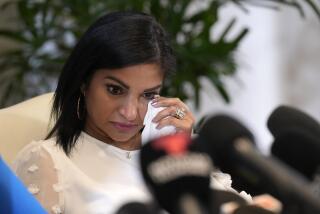Long Beach leaders call for healing after attack
The Long Beach city councilwoman who represents the Bixby Knolls area where a violent attack occurred Halloween night is urging the city to launch a series of workshops to help young people and families citywide deal with the aftermath.
As the trial of 10 youths accused in the attack against three young women continues, Councilwoman Rae Gabelich will take her proposal to the council Tuesday in what she calls an effort to help the city recover from what has been characterized as a racially motivated hate crime.
Meanwhile, more than 60 community leaders and others met privately Thursday with the Long Beach mayor and police chief to talk about how the widely publicized trial is affecting the city.
The discussions offer a glimpse of how officials in the region’s second-largest city are trying to grapple with the assault, which is attracting attention from talk show hosts and various interest groups.
The attack occurred as three white women visited a decorated “haunted” house in Bixby Knolls, a largely middle-class neighborhood north of the San Diego Freeway. The 10 black youths have been charged with assault, and eight of them face a hate crime enhancement.
Gabelich said she is deeply troubled by how the attack is affecting the young people involved, their families and the community.
“There are a lot of victims in this incident,” she said Saturday.
In an item included on the Tuesday agenda, Gabelich wrote: “The terrible incident that took place on Halloween night in Bixby Knolls will have a significant lasting impact on the young people involved, their families, the surrounding neighborhood and the entire city.... This was an isolated incident, born out of a number of factors unique to that time and place, that does not define what Long Beach or the vast majority of our youths is all about.”
Gabelich is proposing a series of what she calls “community family fairs,” beginning in Bixby Knolls in early January and then moving to other areas of the city.
The events could include a youth forum, round-table discussions and a resource fair to highlight opportunities for young people, she said.
The National Conference for Community and Justice, a nonprofit group already working with city officials, could help with the effort, she said.
Tonia Reyes Uranga, a councilwoman representing a district adjoining Bixby Knolls, said Gabelich’s idea is a good one.
She also would like to see the council “make a statement as a body about race in the city and the need to stand together. We really need to show we’re a united city.”
Several people who attended the Thursday meeting said it included representatives of a wide array of racial and ethnic groups. Some expressed concern that the national media were portraying Long Beach as more racially divided than it is, some attendees said.
“There was unity in that room that we’re not going to let others define who we are,” Mayor Bob Foster said Saturday.
Some have suggested having a public event of some kind to illustrate that Long Beach is a united, racially diverse city, he said.
“Black, white, Jews, Muslims, all across the board -- everyone at the end was saying the same thing,” said Jackie Bezart, a police officer and a member of the African American advisory group that reports to Police Chief Anthony Batts.
The meeting included several church leaders, including Garon Harden, president of the Long Beach Ministers’ Alliance, which is made up largely of pastors of black churches in the area.
He and others said they do not want outside groups using the trial to promote division in Long Beach.
“We don’t want certain groups coming into our city -- black or white -- special interests, to come in and rock the boat while we wait for the system to run its course,” said Harden, pastor of the Greater Open Door Church in Christ in north Long Beach.
“We’re going to stand together, and we’re not going to let any outside forces bring a wedge to our city.”
*
More to Read
Sign up for Essential California
The most important California stories and recommendations in your inbox every morning.
You may occasionally receive promotional content from the Los Angeles Times.










